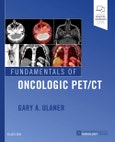- Based on the Annual Oncologic PET/CT Continuing Education Course founded and directed by Dr. Ulaner.
- Provides step-by-step guidance on how to interpret PET/CT images for patients with cancer.
- Uses a unique, highly practical format, presenting common and uncommon findings for each organ system, and then explaining how to best arrive at a diagnosis for those findings.
- Describes how to integrate PET findings with CT, MR, ultrasound, and radiography, to increase specificity of PET findings.
- Features more than 1,000 high-quality PET, CT, and correlative radiographic images, with over 600 in full color.
- Discusses how to avoid common interpretive pitfalls.
- Demonstrates how to organize an FDG PET/CT report efficiently and concisely.
- Includes a separate chapter on novel radiotracers - including Sodium Fluoride, DOTATATE, Choline, Fluciclovine, and PSMA targeting agents. - Expert ConsultT eBook version included with purchase. This enhanced eBook experience allows you to search all of the text, figures, and references from the book on a variety of devices.
Table of Contents
Fundamentals of Oncologic PET/CT, 1eSection I: Introduction and Fundamentals
1. Introduction to FDG PET/CT
2. Fundamentals of an Oncologic FDG PET/CT Report
Section II: Musculoskeletal System and Body Wal
3. Skeleton
4. Muscle, Nerve
5. Skin, Breast
Section III: Head and Neck
6. Brain
7. Face and Neck
Section IV: Thorax
8. Lung
9. Pleura
10. Mediastinum - Vessels and Masses
11. Cardiac
Section V: Abdominal Solid Organs
12. Hepatobiliary (Liver, Gallbladder, Biliary Tree)
13. Spleen
14. Pancreas
15. Adrenal
16. Kidney
Section VI: Gastrointestinal Tract and Peritoneum
17. Esophagus
18. Stomach
19. Small bowel
20. Colon, Anus
21. Peritoneum
Section VII: Pelvis
22. Ovary
23. Uterus - Endometrium, Myometrium, Cervix
24. Testis
25. Prostate
26. Bladder
Section VIII: Lymph Nodes
27. Lymph Nodes
Section IX: Radiotracers in Development
28. Fluciovine, Dotatate, and Sodium Fluoride








